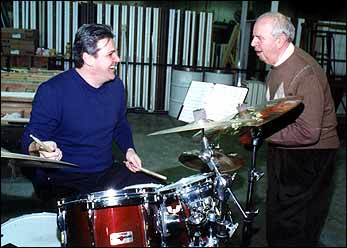Wallside's History: A Labor of Love
You cannot tell the story of Wallside Windows without telling that of a one-time fruit vendor named Martin Blanck. They are one and the same.
The son of Eastern European immigrants pedaled produce to help support his family while growing up in Detroit, and after his Army service he embarked on an American dream to be his own boss.
A Shoe String Start
With little money to invest, he started a home-improvement business in 1944. He worked hard to line up one project after another for contractors who met his standards, and in return he demanded a certain level of quality and service.
A salesman above all, he would leave a new customer feeling comfortable they'd made the right decision to put their trust in him. And rarely would he be proved wrong.
For Martin Blanck was not one to put his name on a piece of poor work. To him it was a point of honor: You left the customer satisfied, or the job wasn't finished. How could you build a business otherwise?
Character Meets The Right Product
In the early 1970s, as energy prices soared and the government offered tax incentives for conservation, Martin Blanck read an article in The New York Times about an emerging trend in home improvement: vinyl replacement windows.
Vinyl was more energy efficient than wood, easier to install and maintain, and it had a long life. It captured the interest of the businessman who harbored a dream of building a business that would outlast himself. He embraced it.
Martin Blanck's Wallside Windows began on Schaefer Road in Detroit with a few machines, a few employees, and its owner's steadfast commitment to a few key values. He remained the company salesman, the setter of standards and the guarantor of customer satisfaction.
Taking It To The Air
Ahead of his time, he turned to daytime television advertising and became his company's spokesman. He was known for his unassuming light-colored suits, his humble pitch, and his bottom line: "We will not be undersold."
The phones lit up. Wallside Windows mushroomed by any measure. The square footage of its facility went from 7,000, to 15,000, to 36,000. Martin Blanck hired salespeople and imparted upon them his values: Work hard, be straight up, and always take care of the customer.
He loved coming to work, and he enthusiastically took visitors on tours of his factory. This is where we do this, he would say. This is how we make this.
A Good Boss
Wallside founder Martin Blanck kicks it during a holiday party in the plant.
He cared greatly for the workers who showed their commitment to his ideals, and he was well-liked by them in return. Factory workers welcomed his frequent visits to the floor. Every year his employees and contractors celebrated his birthday with an office party.
Parkinson's disease began demanding his time and capacities in the 1990s, but Martin Blanck continued to come to the office until December 2000, when he no longer could. He died in January 2001.
His funeral was huge, and after his death his family received letters and faxes from across Metro Detroit including from people who said they had bought Wallside Windows and wanted to say how much they thought of Martin Blanck and what he stood for.
Three Generations, Same Values
Blanck's sons and grandson celebrate Wallside's 72nd Anniversary.
His employees took up a collection among themselves and commissioned a portrait of their late boss that today hangs outside his former office in the company's 72,000-square-foot factory in Taylor, just east of Metro Airport. Wallside Windows is one of the largest employers in Taylor.
With about 140 employees and hundreds more contractors, Wallside Windows is one of the largest window manufacturing and home-improvement companies in the United States.
Three generations later, Martin Blanck's values are still paramount today in the company run by his sons and grandson.





